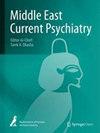Effects of child abuse and neglect on executive functions among children diagnosed with learning disabilities or attention deficit and hyperactivity disorder
IF 1.6
Q3 PSYCHIATRY
引用次数: 0
Abstract
Abstract Background Studying cognitive deficits due to abuse and neglect in vulnerable children with neurodevelopmental disorders can fuel the battle to save them. We aimed to assess effects of child abuse and neglect on executive functions (EF) among children diagnosed with attention deficit and hyperactivity disorder (ADHD) and specific learning disorders (SLD). Three hundred forty drug-naive children were divided into four groups according to their diagnosis. They have all been through history taking, clinical interview, assessment of exposure to abuse or neglect, Barkley Deficit in Executive Functioning Scale-Children and Adolescents (BDEFS-CA), and Conners and intelligence quotient (IQ) test. Results Children with ADHD or SLD were significantly exposed to abuse and neglect showing significant executive dysfunctions. The mostly affected domains with abuse among ADHD were emotion regulation with effect size (ES): 0.576, self-restraint ES: 0.38 and self-motivation ES: 0.256, abuse was significantly associated with lower social class 63.6% ES: 0.377 while neglect was significantly associated with parents’ marital status of being divorced 92% ES: 0.621. Abuse and neglect were significantly associated with emotion regulation executive dysfunction with OR 23.5 and 22.8 respectively. Conclusion Executive dysfunctions are significantly related to exposure to abuse and neglect. The most affected domains were emotion regulation and self-restraint executive functions. Also, we concluded that prevalence of abuse and neglect to be significantly higher in lower social class than average and higher classes and in divorced parents than married ones. Health education and early intervention programs should be directed more specifically to the more vulnerable children diagnosed with neurodevelopmental disorders and of lower social class or of divorced parents.儿童虐待和忽视对诊断为学习障碍或注意缺陷和多动障碍儿童执行功能的影响
背景研究易受伤害的神经发育障碍儿童因虐待和忽视而导致的认知缺陷,可以为拯救他们的战斗提供动力。我们的目的是评估儿童虐待和忽视对诊断为注意缺陷多动障碍(ADHD)和特殊学习障碍(SLD)的儿童执行功能(EF)的影响。340名无药儿童根据诊断情况分为四组。他们都经过了历史记录,临床访谈,暴露于虐待或忽视的评估,巴克利执行功能缺陷量表-儿童和青少年(BDEFS-CA),以及康纳斯和智商(IQ)测试。结果ADHD或SLD患儿明显暴露于虐待和忽视,表现出明显的执行功能障碍。ADHD儿童受虐待影响最大的领域是情绪调节,效应值为0.576,自我约束效应值为0.38,自我激励效应值为0.256,虐待与低社会阶层显著相关,效应值为63.6%,效应值为0.377,忽视与父母离异婚姻状况显著相关,效应值为92%,效应值为0.621。虐待和忽视与情绪调节执行功能障碍显著相关,OR分别为23.5和22.8。结论执行功能障碍与遭受虐待和忽视有显著关系。受影响最大的领域是情绪调节和自我约束执行功能。此外,我们还得出结论,在社会阶层较低的人群中,虐待和忽视的发生率明显高于平均水平,而在社会阶层较高的人群中,离婚的父母比已婚的父母更普遍。健康教育和早期干预计划应该更具体地针对那些被诊断为神经发育障碍的、社会阶层较低或父母离异的、更脆弱的儿童。
本文章由计算机程序翻译,如有差异,请以英文原文为准。
求助全文
约1分钟内获得全文
求助全文
来源期刊

Middle East Current Psychiatry
Medicine-Psychiatry and Mental Health
CiteScore
3.00
自引率
0.00%
发文量
89
审稿时长
9 weeks
 求助内容:
求助内容: 应助结果提醒方式:
应助结果提醒方式:


